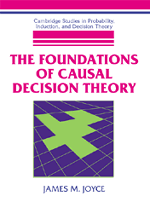Book contents
- Frontmatter
- Contents
- Preface
- Introduction: A Chance to Reconsider
- Chapter 1 Instrumental Rationality as Expected Utility Maximization
- Chapter 2 Decision Problems
- Chapter 3 Savage's Theory
- Chapter 4 Evidential Decision Theory
- Chapter 5 Causal Decision Theory
- Chapter 6 A General Theory of Conditional Beliefs
- Chapter 7 A Representation Theorem for Causal Decision Theory
- Chapter 8 Where Things Stand
- References
- Index
Chapter 8 - Where Things Stand
Published online by Cambridge University Press: 25 July 2009
- Frontmatter
- Contents
- Preface
- Introduction: A Chance to Reconsider
- Chapter 1 Instrumental Rationality as Expected Utility Maximization
- Chapter 2 Decision Problems
- Chapter 3 Savage's Theory
- Chapter 4 Evidential Decision Theory
- Chapter 5 Causal Decision Theory
- Chapter 6 A General Theory of Conditional Beliefs
- Chapter 7 A Representation Theorem for Causal Decision Theory
- Chapter 8 Where Things Stand
- References
- Index
Summary
TWO LESSONS
There are two general lessons that I would like readers to draw from the foregoing chapters. First, it should now be clear that all expected utility theorists can agree about the broad foundational assumptions that underlie their common doctrine. In particular, the representation theorem of Chapter 7 should remove any lingering doubts there might have been about the theoretical underpinnings of causal decision theory. Since the constraints on conditional preferences and beliefs needed to establish the existence of conditional utility representations in Theorem 7.4 are common to both the causal and evidential theories, there is really no difference between them as far as their core accounts of valuing are concerned. If asked the question, “Given a fixed system of beliefs and basic desires, what is the right way to assign utilities to risky or uncertain prospects?” proponents of both positions should answer in exactly the same way, by saying that a prudentially rational agent will use the specified beliefs and desires to compute a news value for each prospect, and that her preferences should go by increasing auspiciousness. In the end, then, Richard Jeffrey was right about the nature of value and Ethan Bolker was correct about the way in which theories of value should be characterized formally. These are points to which all parties should be able to agree.
There remains, of course, an important difference between the causal and evidential approaches to decision theory.
- Type
- Chapter
- Information
- The Foundations of Causal Decision Theory , pp. 252 - 257Publisher: Cambridge University PressPrint publication year: 1999

